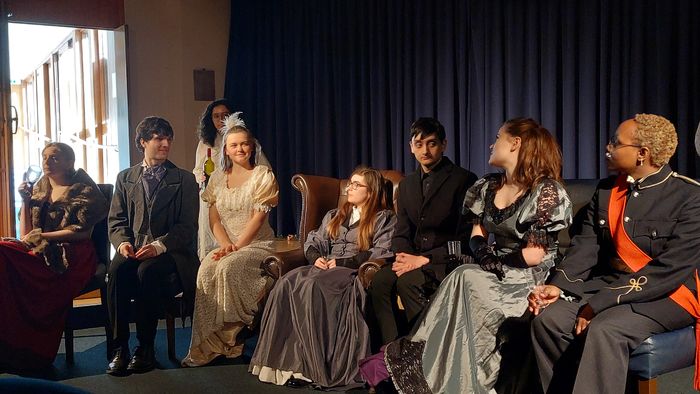A man walks into a cheese shop: An absurd night of cheesy laughs
An enjoyable hour of surrealism, A Man Walks into a Cheese Shop isn’t quite ripe but is still pretty gouda

How would you react if you woke up one morning in an absurdist sketch comedy show? If you’re the protagonist of A Man Walks into a Cheese Shop, the answer is simple: very poorly. Cheese Shop follows Sam, the self-proclaimed Straight Man character – a composed comedic foil to the outright funny people around her – as she navigates an increasingly bizarre world where the nonsensical is the norm.
From the start, I was excited by the premise of Cheese Shop, both for my love of absurdist humour and for its idea to have a main character that the show follows narratively. Absurd comedy hinges on highlighting the illogical by putting characters into irrational situations with strange juxtapositions, and while this style of comedy is difficult to pull off, when done well it highlights the ridiculousness of our everyday lives.
“In the show’s quest for the absurd, it peaked in its energy in the first fifteen minutes”
It’s quite innovative for sketch comedy shows to have a protagonist propelled from sketch to sketch, and Cheese Shop does a fantastic job of setting up their opening and closing scenes such that the entire show felt like it had a sensible through-line. That said, in the show’s quest for the absurd, it peaked in its energy in the first fifteen minutes – and, in an hour-long performance, where can the show go after such an early flash of intensity?
What kept the show moving forward were the actors’ fantastic performances. Niamh Howat shone as Sam, never faltering or dipping in energy as she spent most of the show onstage and frightened by her peers’ absurdist antics. Oscar Matthews and Miles Hitchens impressed with their dynamic physicalities, and every actor showcased the excellent writing of the show’s sketches.
Indeed, one of the production’s strongest elements is its writing. The overall plot of Cheese Shop is simple: Sam, a boring person with a repetitive life, wakes up one morning to discover that her daily routines have been usurped because her life has transformed into a chaotic, absurdist sketch comedy show. By the end of the show, Sam learns that variety is the spice of life, and she manages to escape back to her normal life.
“Every actor showcased the excellent writing of the show’s sketches”
Though the plotline is uncomplicated, it’s Sam’s path through surreal sketches that highlights the writers’ talents. Cheese Shop puts forth a great representation of the cruelty of the world at large – from the uselessness of helplines to the insidiousness of advertising – just as any great absurdist show should. The writers didn’t shy away from incorporating dark humour to heighten the absurdity, like when one of Hitchens’s characters pretended to mow down the audience with an invisible machine gun for his own amusement. The dialogue was rife with puns and wordplay, none of which felt like low-hanging comedic fruit.
If I have any critiques of the writing, it’s that the character Sam isn’t really a comedic Straight Man, even if the dialogue explicitly refers to her as such. (And that’s not because she’s neither straight nor a man, which Sam jokes about in the show.) Given the absurdism, she’s much more of an archetypal Only Sane Man: she reacts negatively to the chaos unfolding around her, yelling and panicking as her mundane life disintegrates. And her life disintegrates very quickly; within a few scenes, Sam finds herself fired from her job while the remaining five cast members shout at each other and at the audience, rushing about the stage as bosses, inspectors, and dogs in a display of physical and vocal cacophony. From there, most of the sketches are only two or three people, leaving a noticeable dip in the show’s energy level.
Despite the occasional technical hiccup, such as missed sound cues or performers being left in the dark, those of us in the auditorium never dipped in enthusiasm for the show. The audience was so loud and raucous throughout, I thought I had joined a sketch comedy version of The Rocky Horror Picture Show as audience members cheered, booed, jeered, and shouted at the performers onstage.
While the show may have benefitted from some further affinage to mature into an exceptional absurdist comedy, I sincerely enjoyed the charcuterie board of humour the team put forth. I left the show wanting to see more from these writers and performers (and craving some Red Leicester, too).
 Features / Should I stay or should I go? Cambridge students and alumni reflect on how their memories stay with them15 December 2025
Features / Should I stay or should I go? Cambridge students and alumni reflect on how their memories stay with them15 December 2025 News / Cambridge study finds students learn better with notes than AI13 December 2025
News / Cambridge study finds students learn better with notes than AI13 December 2025 Comment / The magic of an eight-week term15 December 2025
Comment / The magic of an eight-week term15 December 2025 News / Uni Scout and Guide Club affirms trans inclusion 12 December 2025
News / Uni Scout and Guide Club affirms trans inclusion 12 December 2025 News / News In Brief: Michaelmas marriages, monogamous mammals, and messaging manipulation15 December 2025
News / News In Brief: Michaelmas marriages, monogamous mammals, and messaging manipulation15 December 2025










